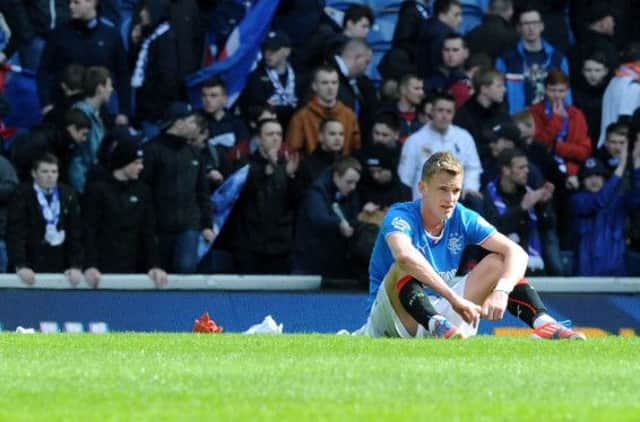Rangers show progress signs in semi-final defeat


Supportive evidence has not been hard to find: although the Ibrox club go into tonight’s match with Forfar still unbeaten in League 1, they have consistently struggled to kill off far weaker opponents.
However, Saturday’s Scottish Cup semi-final against Dundee United has at least suggested that McCoist’s team may not have so far to travel as the manager thinks, or perhaps that they can make up the ground more rapidly than he might forecast. On another day, Rangers would have beaten one of the best teams in the country, rather than losing 3-1. Although deprived of their first-choice goalkeeper, Cammy Bell, and their best outfield player, Lee Wallace, they were in the tie for all but the last few minutes.
Advertisement
Hide AdAdvertisement
Hide AdIt has been generally accepted that Rangers have fallen towards the level of their opponents, both last season in the old Division Three and this year a division higher. Although the core of the side has Premier experience – Lee McCulloch, Ian Black, Jon Daly and Nicky Law, as well as the aforementioned Bell and Wallace – they have simply been unable to maintain the form they had as individuals in the top flight.
But given those players’ history, and their evident ability to play at the highest level of the domestic game, how long would it take them to rediscover their old form? In other words, might not Rangers raise their game in the Championship and then the Premiership just as swiftly as they let their standards slip when lower down the league?
Understandably, McCoist refuses to regard that Ibrox semi-final as sufficient evidence to arrive at a verdict. While he was proud of his team’s display, he explained yesterday that he had as yet no way of telling whether they could perform to that level every week against teams of United’s calibre.
“The biggest feeling is of disappointment at getting knocked out,” he said when asked to reflect on the Ibrox match, which took place a day before St Johnstone beat Aberdeen in the second semi-final at the same venue. “It would have been fantastic to go to a final against St Johnstone. That’s the overriding emotion.
“But, at the same time, there is a degree of pride at how the boys performed. It showed myself and the staff that we can compete with a top-flight side; that we can handle it on a one-off basis.
“What I don’t know is whether we’d be good enough to do it on a regular basis. That’s where there’s uncertainty.
“The atmosphere made for a great occasion and I thought we handled that side of it. But, obviously, I’d still like to strengthen the squad and make it a little bit easier.
“I’ve watched the game again, and we were actually better than I thought we were during it. It’s the oldest one in the book: if you don’t take your chances and make silly errors, you don’t win games. That’s what cost us.
Advertisement
Hide AdAdvertisement
Hide Ad“We could have scored early through [Bilel] Mohsni, then [Dean] Shiels had a great chance, and big Jon [Daly] had one. For the first goal we could have done better, and for the second, we could absolutely have done more to prevent it. The third goal was just a comedy of errors.”
McCoist has shouldered a lot of the blame for some of the poor performances by his team, but Rangers are not the only example of a club who have succumbed, at least to a degree, to the mediocrity which has surrounded them. Celtic too, for all that they have retained their championship by a yawning margin, have looked uninspired at times this season, even in victory.
The loss of key personnel has been a big factor in the case of Neil Lennon’s team, of course, but perhaps such backsliding is simply inevitable. When you can win regularly without being stretched to your utmost, why try harder for the sake of it? There may be few players who go so far as to decide not to try their best, but subconsciously many must succumb to the temptation to ease off a bit.
And, as McCoist went on to say, the Glasgow clubs are not the only ones to have experienced the syndrome. “Christian Dailly made a good point on Saturday when he said that when Dundee United were relegated during his time there, he felt the team’s level of performance dropped due to the opposition,” he said.
“Whether that’s acceptable or not is up for debate, but I can certainly understand it. I think that was a back-handed compliment to our players for winning 29 out of 31 games in League One. The fact that we raised the bar on Saturday proved that we can lift it against better opposition and do ourselves justice.”
Unsurprisingly, like any other manager, McCoist will always claim he needs more players, and there are areas of his team where that claim has indisputable merit. But by playing with considerable credit against Dundee United, more than a few members of the manager’s squad have shown they could have what it takes to remain in the reckoning at Rangers for some time to come.